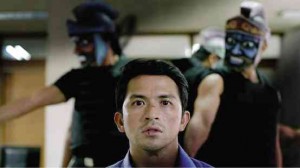We’ve always regarded the opening of Cinemalaya, the country’s premier indie fest, with great anticipation because, unlike other festivals (Cinema One, CineFilipino, Sineng Pambansa, MMFF, etc.), it deftly balances thematic pertinence with a measure of accessibility: Most of its directors don’t produce films that only they can understand—and they don’t alienate the audience they’re supposed to develop.
But, halfway through our four-day, 15-film marathon at Cinemalaya X last week, we realized there was something amiss—only one of the eight films we saw (New Breed’s “Mariquina,” by Milo Sogueco) was satisfying.
When we finally wrapped up our movie-hopping last Tuesday, there was even more cause for concern—because our must-see list yielded just five titles, with only one substantial production coming from the Director’s Showcase, Michael Tuviera’s “The Janitor.”
The other three viewable films are Giancarlo Abrahan V’s “Dagitab,” Ida Anita del Mundo’s “K’Na, The Dreamweaver” and Francis Xavier Pasion’s “Bwaya.”
In telling contrast, last year, seven of the 10 entries in the New Breed category and three of the five in the Director’s Showcase were exceedingly engaging—that’s twice more than this year’s yield!
What went wrong? Have there been changes in the festival’s vetting or monitoring process? Even some portrayals of the films’ stellar performers have been compromised—except for the prodigious Nora Aunor, who rises above the confounding convolutions and thematic pretensions of Joel Lamangan’s “Hustisya.”
Aunor portrays Biring Cabahug, who helps her lecherous best friend, Vivian (the terrifyingly treacherous Rosanna Roces), run her human-trafficking business. Nora need not worry about getting her thespic thunder stolen, because there aren’t a lot of substantial roles for women in the Director’s Showcase.
Ironically, Lamangan does better—as an actor—in GB Sampedro’s frustratingly flimsy and episodic “Separados,” where he displays impeccable comedic timing as Barangay Captain Alberto Flores, who mediates the domestic strife of battered husband Erik Santos and abusive wife Iwa Moto.
The movie follows the overlapping tales of six men in an age of moral ambiguity who converge at a church wedding. In one of his three notable performances in the festival, Ricky Davao portrays a married man who comes out of the closet after 26 years and falls in love with cash-strapped junkie, Arman (Jason Abalos). This is where the film’s unintentionally hilarious “supernatural” side story is introduced.
In Tuviera’s star-studded crime drama, “The Janitor” (which is the best in the Director’s Showcase), Ricky is cast as a crooked police chief opposite the exceptional Dennis Trillo, whose character, disgraced cop Crisanto Espina, agrees to “exterminate” the suspects of a bank robbery that claimed the lives of 10 victims, in the hope of getting reinstated. Dante Rivero similarly scintillates as Trillo’s cruel father.
But, it is in Sogueco’s poignant “Mariquina” where Davao, Barbie Forteza, Che Ramos and the sensational Bing Pimentel deliver career-best portrayals. It follows Imelda Nuñez (the outstanding Mylene Dizon) as she comes to term with the heartbreaking suicide of her emotionally estranged father, Romeo (Davao).
The bittersweet drama is as much about the irreparable damage of unspoken truths as it is about the healing power of hope and forgiveness—and it cleverly breaks the character stereotypes we often see in schmaltzy domestic dramas about faithless husbands, silently suffering wives and manipulative madrastas.
Abrahan’s brilliantly meditative “Dagitab” is just as extraordinary. It examines the 20-year marriage of college professors, Issey and Jimmy (Eula Valdez and Nonie Buencamino)—and the contentious issues that keep them from living their happily-ever-after.
It features a crackerjack portrayal by Eula, whose character is dragged into a scandal involving her troubled godson (Martin del Rosario)—and a surprising twist that is guaranteed to take viewers’ breath away.
Eula’s fiercest competitor in the New Breed’s lead actress race is Angeli Bayani (in Pasion’s metaphor-heavy “Bwaya”), who skillfully limns her character, Divina, a poor mother who grieves over the dreadful death of her 13-year-old daughter, Rowena—who gets eaten by a crocodile in the marshlands of Agusan del Sur!
Set in picturesque Lake Sebu, Ida del Mundo’s T’boli fairy tale, “K’na, The Dreamweaver,” puts ace cinematographer Lee Briones’ eye for beauty and distinctive skills in visual storytelling to great use as it tells the tale of star-crossed lovers, Princess K’na (Mara Lopez) and abaca farmer Silaw (RK Bagatsing), who must sacrifice their love for each other to seal the peace accord between two warring tribes in Mindanao. But, as they say, true love never dies.
Nova Villa is also a refreshing presence in Real Florido’s moderately amusing but slow-paced “1st Ko Si Third”—as Cory, a bored retiree who feels trapped in the tedium of her “stable” marriage to Andong (Dante Rivero). Then, she gets a welcome shot of adrenaline when she runs into former flame Robert (Freddie Webb)—and sparks fly again! Will she choose Mr. Excitement over Mr. Reliable?
Joselito Altarejos has always been a competent storyteller—even when he tackles risqué subject matter with a cautionary ending (“Lihim Ni Antonio,” “Unfriend”). “Kasal” starts out auspiciously (and we’re not referring to the graphic sex scenes of its gay couple, played by Arnold Reyes and Oliver Aquino)—but, it soon succumbs to its meandering pace and never recovers until it reaches its underwhelming finale.
Nick Olanka’s plodding “Ronda” has an appealing concept: It has AiAi delas Alas roaming the city of Manila to look for her troubled son as she performs her duties as a cop. Unfortunately, it is gravely undermined by sluggish development, ill-conceived characters and actors who are tasked to improvise distracting scenes and roles that require some lived-in familiarity to them:
We see AiAi, Cesar Montano and Angeli Bayani “pretending” to be character types that don’t look—or sound—convincing or credible. But, the comebacking Bernardo Bernardo is a joy to watch in a brief but striking sequence—as a double-dealing pimp!
Carlitos Siguion Reyna’s tonally and thematically frivolous “Hari ng Tondo” has entertaining moments—but, it’s hard to find empathy with its protagonist, a business mogul on the brink of bankruptcy (Robert Arevalo), who “endangers” the lives of his grandchildren (Cris Villonco, Rafa Siguion-Reyna) by letting them live with him in Tondo.
AUNOR. Rises above “Hustisya’s” confounding convolutions. AUNOR. Rises above “Hustisya’s” confounding convolutions.
A responsible “lolo” exposing his beloved heirs to “pagpag,” violence and sex when he doesn’t really have to just doesn’t make sense. But, the film features great music from Myke Salomon and an adorable turn from Villonco.
Louie Ignacio’s “Asintado,” about a young man (Jake Vargas) who loses the drugs he’s supposed to deliver, is trite, predictable and excruciatingly slow.
The dark scenes in Roderick Cabrido’s “Children’s Show,” about teenagers who risk life and limb by engaging in underground wrestling matches for a quick buck, dilute the youthful vibe and urgency of its story, while Janice and Denise O’Hara’s “Sundalong Kanin,” about four teenage boys confronted with the realities of war, is weighed down by a “telenovela”-like sensibility and over-the-top characterizations.
We liked Gino Santos’ “The Animals” and “Island Dreams”—but, the mind-boggling “#Y” rankles with its nihilistic and contradictory views about life, and makes its attractive young protagonists (including the promising Coleen Garcia) look bland and shallow as they unintentionally help “romanticize” suicide.



